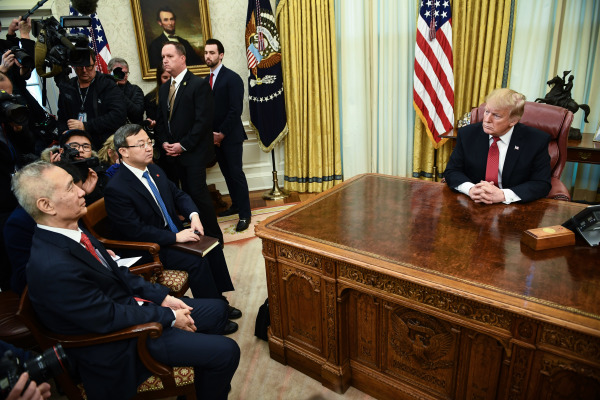
1月31日,美國總統川普在白宮橢圓形辦公室會晤中國副總理劉鶴。(圖片來源:BRENDAN SMIALOWSKI/AFP/Getty Images)
【看中國2019年2月1日訊】美中兩國高層官員星期四結束了兩天的貿易談判,美國總統川普(特朗普)星期四下午在白宮橢圓形辦公室會晤了中國首席談判代表、副總理劉鶴。川普說,雖然中國在保護知識產權和技術方面有了進展,但這不意味著雙方已經達成協議,兩國將繼續會談。白宮新聞秘書辦公室就本次高層貿易談判發表了一份聲明。聲明全文翻譯如下:
美國有關中國會談的聲明
過去兩天來,美國和中國的高級官員就我們兩國之間的經濟關係進行了緊張而富有成效的談判。美方讚賞劉鶴副總理和他的團隊在整個會談期間所展現出的充分準備和勤勉敬業。
會談涵蓋了範圍廣泛的問題,包括:(1)美國公司被迫向中國轉讓技術的做法;(2)在中國境內加強知識產權保護和執行的需要;(3)美國公司在中國所面臨的大量關稅和非關稅壁壘;(4)中國對美國商業財產進行的網路盜竊所造成的傷害;(5)扭曲市場的力量,包括補貼和國有企業,如何可能導致產能過剩;(6)取消限制美國向中國銷售製造業、服務業和農業產品的市場壁壘和關稅的需要;(7)貨幣在美中貿易關係中所起的作用。雙方還討論了減少美國對中國的數額巨大且不斷增長的貿易逆差的需要。中國從我們的農場主、牧場主、製造商和公司企業購買美國產品是談判的關鍵部分。
雙方展現出願就所有重大問題進行接觸的有益願望,並在談判期間就如何化解我們的分歧進行了富有成效和技術性的討論。美國尤其側重於就結構性問題和減少逆差達成有意義的承諾。
雖然取得進展,但仍有很多工作要做。唐納德·J·川普總統重申,在布宜諾斯艾利斯達成的90天進程是嚴格期限,而且除非2019年3月1日之前美中達成滿意結果,美國將提高關稅。美國期盼著就這些至關重要的議題與中國展開進一步會談。
白宮聲明全文如下:
Statement of the United States Regarding China Talks
For the last two days, high-ranking officials from the United States and China have engaged in intense and productive negotiations over the economic relationship between our two countries. The United States appreciates the preparation, diligence, and professionalism shown throughout these meetings by Vice Premier Liu He and his team.
The talks covered a wide range of issues, including:(1)the ways in which United States companies are pressured to transfer technology to Chinese companies;(2)the need for stronger protection and enforcement of intellectual property rights in China;(3)the numerous tariff and non-tariff barriers faced by United States companies in China;(4)the harm resulting from China’s cyber-theft of United States commercial property;(5)how market-distorting forces, including subsidies and state-owned enterprises, can lead to excess capacity;(6)the need to remove market barriers and tariffs that limit United States sales of manufactured goods,services,and agriculture to China;and(7)the role of currencies in the United States–China trading relationship. The two sides also discussed the need to reduce the enormous and growing trade deficit that the United States has with China. The purchase of United States products by China from our farmers, ranchers, manufacturers, and businesses is a critical part of the negotiations.
The two sides showed a helpful willingness to engage on all major issues, and the negotiating sessions featured productive and technical discussions on how to resolve our differences. The United States is particularly focused on reaching meaningful commitments on structural issues and deficit reduction. Both parties have agreed that any resolution will be fully enforceable.
While progress has been made, much work remains to be done. President Donald J. Trump has reiterated that the 90-day process agreed to in Buenos Aires represents ahard deadline, and that United States tariffs will increase unless the United States and China reach asatisfactory outcome by March 1, 2019. The United States looks forward to further talks with China on these vital topics.
